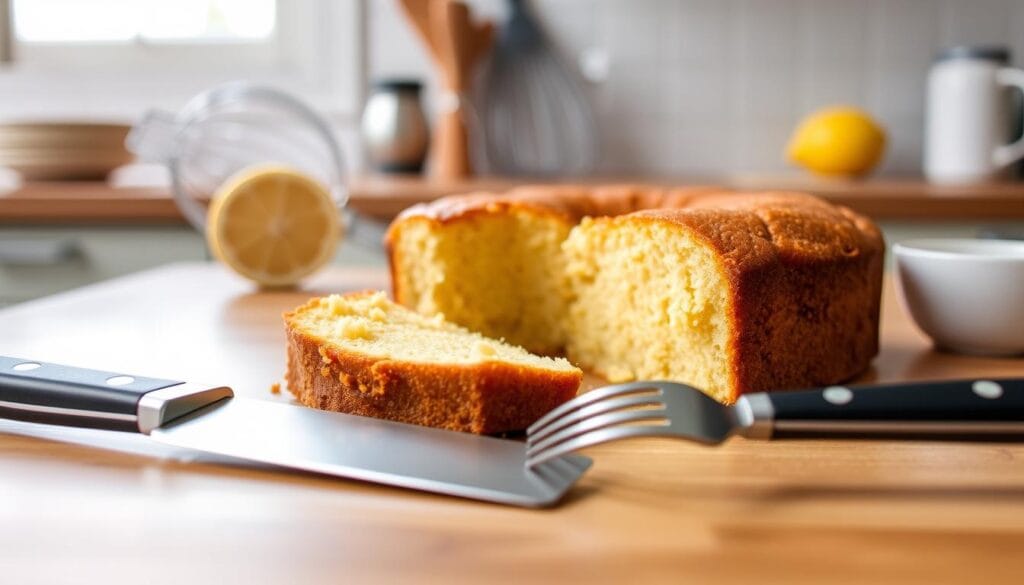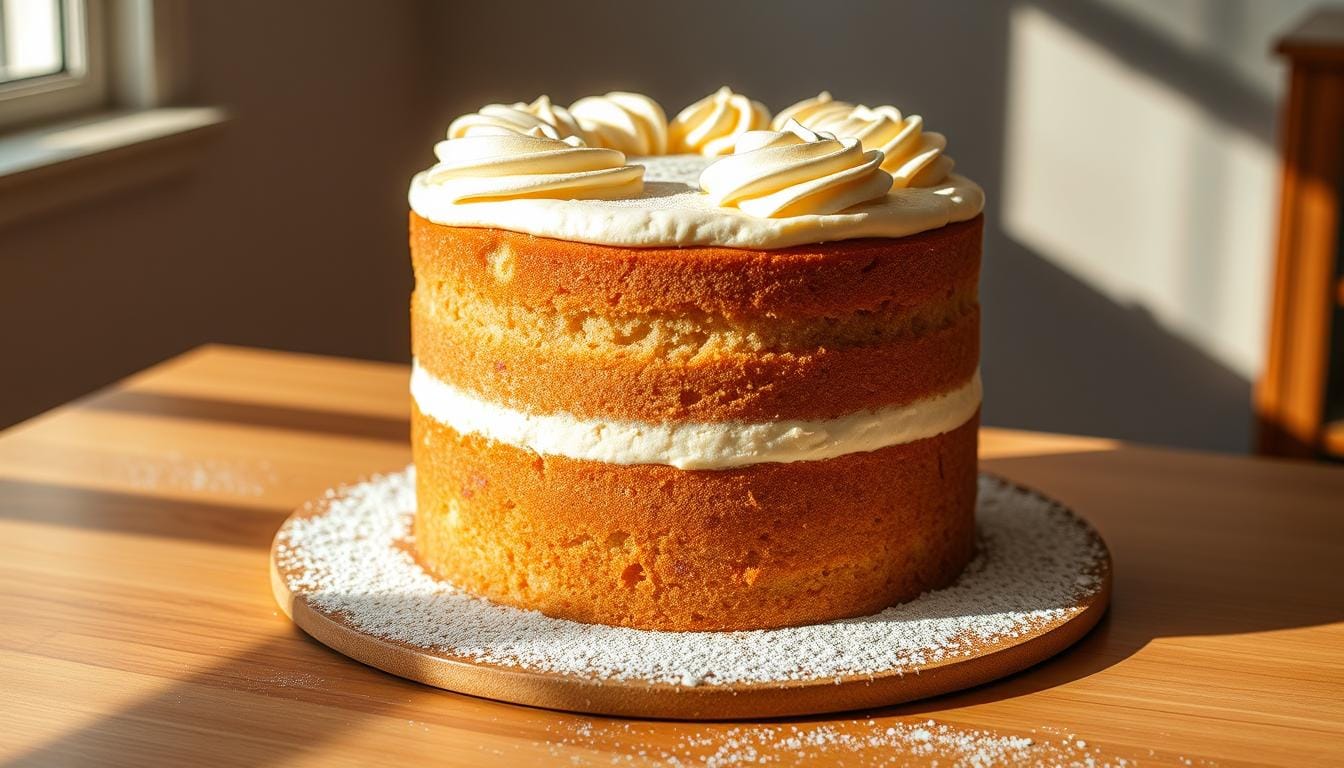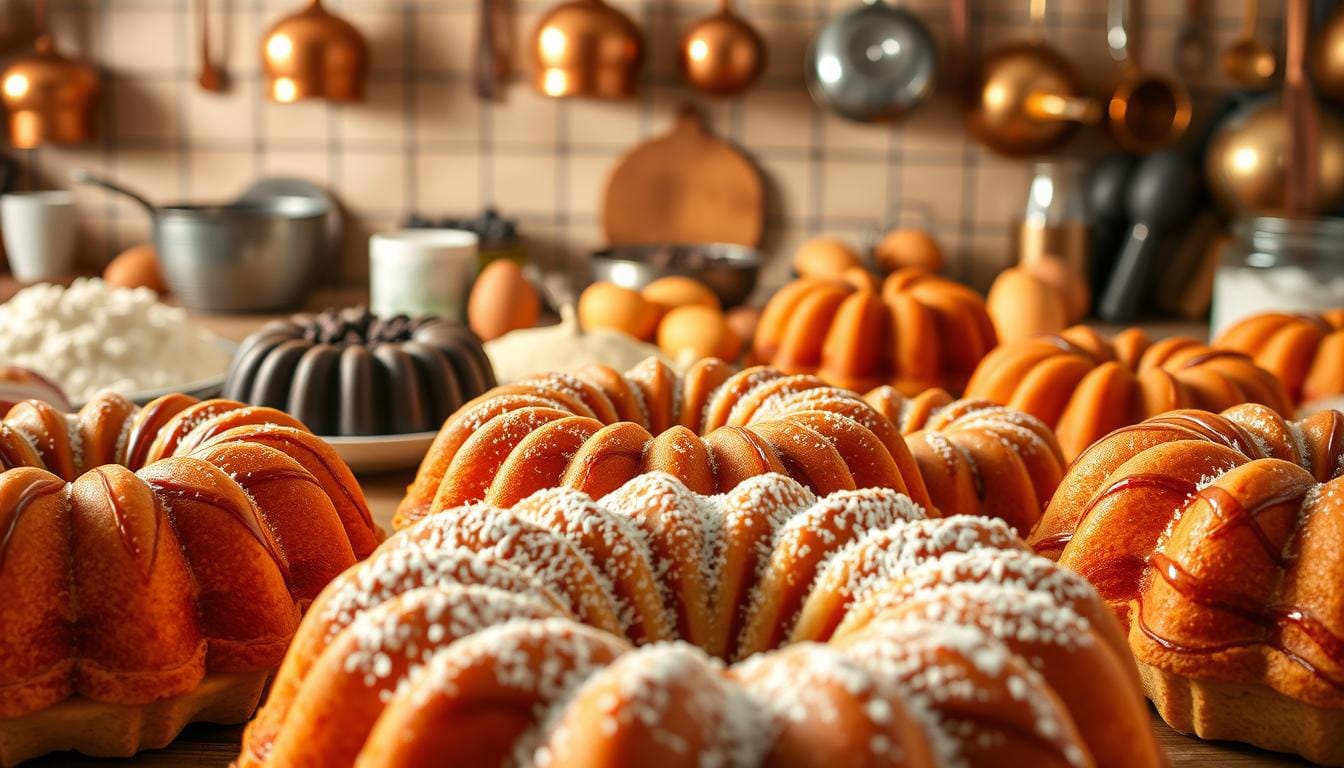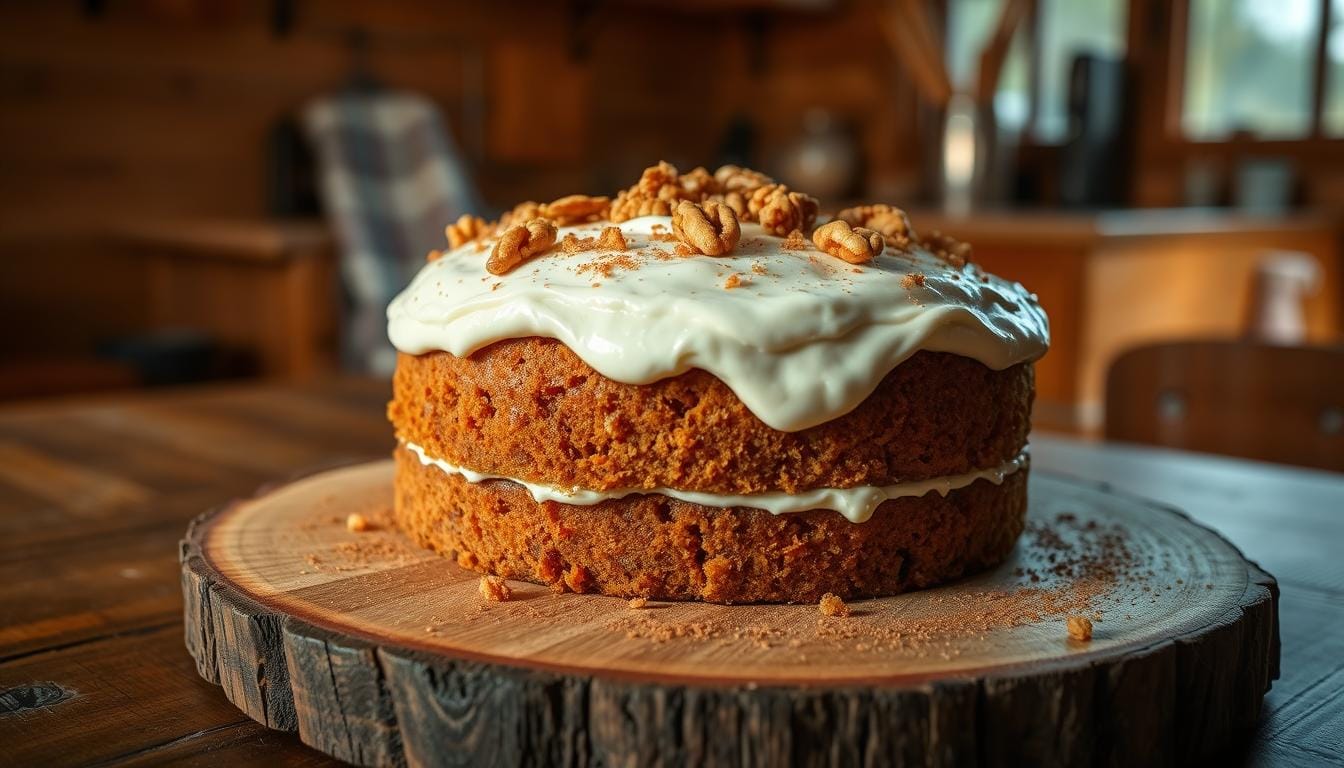Classic Lemon Pound Cake Recipe – Easy & Moist
Table of Contents
Ever walked into a kitchen and smelled fresh lemons? That’s the magic of a classic lemon pound cake. It turns simple ingredients into a sublime dessert. My love for it started in my grandmother’s kitchen, where baking was an expression of love.
This lemon pound cake recipe is a game-changer for home bakers. It’s easy to make, whether you’re new or experienced. Its moist texture and vibrant citrus flavor make every bite special. You can make a bakery-worthy dessert in your own kitchen.
This cake is special because it’s simple. With just a few pantry staples and fresh lemons, you can impress everyone. The recipe balances rich, buttery cake with bright, zingy lemon notes.
Get ready to discover why this lemon pound cake recipe is a classic in American kitchens. Your baking adventure starts right here!
Introduction to Lemon Pound Cake
Lemon pound cake is a favorite citrus dessert. It turns a classic recipe into a bright, tangy treat. This cake mixes the richness of traditional pound cake with the zesty punch of fresh lemons. It’s both comforting and exciting.
What Makes Lemon Pound Cake Unique?
The magic of lemon pound cake is in its unique traits. It has a dense texture and vibrant flavor. This mix of buttery richness and citrus brightness makes it stand out from other cakes.
- Dense yet moist crumb texture
- Intense lemon flavor throughout
- Versatile dessert for various occasions
The Importance of Fresh Lemons
Fresh lemons are key to an exceptional lemon cake. The zest and juice add an unparalleled brightness that artificial flavors can’t match. Using fresh citrus makes your pound cake go from good to extraordinary.
Here’s why fresh lemons are so important:
- They provide natural, vibrant citrus notes
- They add natural acidity to balance sweetness
- They introduce essential oils that enhance flavor
Your lemon pound cake becomes more than a dessert. It’s a culinary experience that celebrates the bright, refreshing qualities of fresh citrus desserts.
Essential Ingredients for Lemon Pound Cake
Starting with the right ingredients is key to making delicious baked goods. When you bake at home, picking the best ingredients is crucial. This ensures your lemon pound cake is moist and full of flavor. Let’s look at the main ingredients that make your kitchen a place of joy.
The heart of a great pound cake is its ingredients. Here’s what you’ll need:
- Flour: Gives your cake structure and texture
- Butter: Adds richness and makes the cake tender
- Eggs: Hold everything together and keep the cake stable
- Sugar: Sweetens and helps with browning
- Fresh lemons: Add a bright, zesty taste to the cake
Key Ingredients Breakdown
Knowing how each ingredient works is important in baking. The quality of your ingredients affects your lemon pound cake’s taste and texture.
| Ingredient | Purpose | Recommended Type |
|---|---|---|
| All-Purpose Flour | Provides cake structure | Unbleached, sifted |
| Unsalted Butter | Creates moisture and flavor | European-style, room temperature |
| Large Eggs | Binds ingredients | Fresh, room temperature |
| Granulated Sugar | Adds sweetness | Fine, pure cane sugar |
Substitutions for Common Allergens
You can make baked goods for different diets. For those with allergies or special diets, here are some options:
- Gluten-free flour blend instead of all-purpose flour
- Vegan butter or coconut oil instead of regular butter
- Egg replacer or mashed banana for egg-free options
- Alternative sweeteners like maple syrup or coconut sugar
Successful baking is about knowing your ingredients and trying new things. Each change might affect the texture. So, don’t be afraid to experiment and find the perfect recipe for you.
Equipment Needed
Creating delicious cakes needs the right tools. Before starting, make sure you have the essential baking equipment. The right tools can greatly improve your cake’s taste and texture.
Must-Have Baking Tools
Every baker needs a basic set of tools. Here are the must-haves for your kitchen:
- 9×5 inch loaf pan
- Electric mixer or stand mixer
- Large mixing bowls
- Measuring cups and spoons
- Rubber spatula
- Cooling rack
- Microplane or zester
Optional Tools for Enhanced Baking
These tools are not essential but can make baking better:
| Optional Tool | Benefit |
|---|---|
| Kitchen scale | Precise ingredient measurements |
| Silicone baking mat | Easy cake removal and cleanup |
| Offset spatula | Smooth batter spreading and decorating |
| Parchment paper | Prevents sticking and easy cake removal |
Quality baking tools can take your cakes from good to extraordinary. Each tool is important for making a perfect lemon pound cake. It will surely impress your loved ones.
Step-by-Step Instructions
Making the perfect lemon pound cake needs care and precision. This guide will make your baking a breeze. You’ll get delicious results with these easy steps.
Preparing the Batter
Begin by getting all your ingredients ready at room temperature. This step is key for smooth mixing and a great texture.
- Cream butter and sugar until light and fluffy
- Add eggs one at a time, mixing thoroughly
- Incorporate fresh lemon zest for maximum flavor
- Gently fold in dry ingredients to prevent overmixing
Baking Time and Temperature
When baking, precision is important. Preheat your oven to 325°F (165°C) for even baking and a golden look.
- Use a 9×5 inch loaf pan
- Grease pan thoroughly
- Bake for 60-75 minutes
- Rotate pan halfway through baking
Checking for Doneness
Knowing when your lemon pound cake is done is key. Here are a few ways to check.
- Insert a toothpick in the center
- Look for golden-brown edges
- Cake should spring back when lightly touched
- Temperature should reach 200-205°F at center
Follow these steps, and your lemon pound cake will wow everyone. It’s sure to impress your family and friends.
Tips for Achieving the Perfect Texture
Making a perfect pound cake needs careful technique and the right ingredients. Your baking skills can turn a simple dessert into a special treat. This is done by mastering a few key principles that affect the cake’s texture and taste.
The secret to a great pound cake is knowing how ingredients work together when baking. Your success comes from choosing top-notch ingredients and mixing them just right.
Choosing the Right Flour
Flour choice is key for your pound cake’s texture. Here are some tips for the best results:
- Use all-purpose flour for a classic, tender crumb
- Sift flour to remove lumps and ensure even distribution
- Measure flour precisely using the spoon-and-level method
The Role of Creaming Butter and Sugar
Creaming butter and sugar is vital for a light, airy pound cake. This step adds air to your batter, making the cake delicate.
| Creaming Technique | Expected Result |
|---|---|
| Room temperature butter | Smooth, fluffy mixture |
| Gradual sugar addition | Maximum air incorporation |
| Beat until pale and fluffy | Lighter cake texture |
By mastering these techniques, you’ll make your pound cake truly special. It will impress with its perfect texture and rich flavor.
Storing Your Lemon Pound Cake
Keeping your homemade lemon pound cake fresh is key. You can enjoy it right away or save it for later. Knowing how to store it right will keep it moist and tasty.
Best Practices for Freshness
For a fresh lemon pound cake, follow these easy steps. Storing it at room temperature is best for short-term. Here’s how to keep your cake’s texture perfect:
- Store at room temperature in an airtight container
- Keep away from direct sunlight and heat sources
- Use a cake dome or sealed plastic container
- Consume within 3-4 days for optimal taste
How to Freeze Lemon Pound Cake
Freezing is a great way to keep your cake fresh longer. Proper wrapping is key to preventing freezer burn and maintaining flavor.
- Cool the cake completely before freezing
- Wrap tightly in plastic wrap
- Add a layer of aluminum foil for extra protection
- Label with the date of freezing
- Store in the freezer for up to 3 months
To enjoy your frozen cake, thaw it at room temperature for 2-3 hours. This way, your lemon pound cake stays moist and delicious. It’s ready to satisfy your sweet tooth whenever you want.
Lemon Pound Cake Variations
Make your lemon cake stand out with creative twists. These changes turn a classic dessert into a masterpiece. Exploring new variations can make baking more exciting.
Find unique ways to make your lemon pound cake special. These ideas will inspire you to try new flavors and textures. They’ll enhance the bright, zesty taste of this beloved dessert.
Adding Berries for Extra Flavor
Berries can make your lemon cake even better. They add a delightful flavor mix. Here are some berry options:
- Blueberries: Mix in fresh or frozen blueberries for fruity bursts
- Raspberries: Add a tart touch to the sweet lemon cake
- Strawberries: Create a vibrant, summer citrus dessert
When adding berries, lightly dust them with flour. This helps them stay even and not sink.
Glazing Your Cake
A great glaze can elevate your lemon cake. Try these glazing ideas:
- Classic lemon glaze with powdered sugar and fresh lemon juice
- Cream cheese glaze for extra richness
- Lavender-infused glaze for a fancy twist
The secret to a perfect glaze is its consistency. It should be smooth to drizzle but cling to the cake.
Serving Suggestions
Make your dessert ideas shine with these creative serving tips for classic cakes like lemon pound cake. The right way to present it can turn a simple dessert into a memorable experience.
Perfect Beverage Pairings
Choosing the perfect drink can really bring out the flavors of your lemon pound cake. Here are some great drink options:
- Earl Grey tea with its bergamot notes
- Cold brew coffee for a rich contrast
- Sparkling white wine for elegant occasions
- Chamomile tea for a soothing afternoon treat
Elegant Presentation Ideas
Turn your classic cakes into stunning desserts with these presentation tips:
| Occasion | Presentation Technique |
|---|---|
| Dinner Party | Garnish with candied lemon peels and fresh mint |
| Brunch | Dust with powdered sugar and serve on vintage china |
| Summer Gathering | Accompany with fresh berries and edible flowers |
Pro tip: Slice your lemon pound cake using a serrated knife for clean, precise cuts that showcase the cake’s delicate texture. A warm knife can help create even more beautiful slices for your special occasion.
Creative Serving Suggestions
Try new ways to enjoy your lemon pound cake:
- Create trifle layers with whipped cream
- Crumble as a topping for fruit parfaits
- Serve alongside vanilla ice cream
- Use as a base for a deconstructed dessert
Troubleshooting Common Issues

Baking the perfect lemon pound cake can be tough, even for pros. Knowing common problems helps make tasty treats every time.
Don’t worry if things don’t turn out right. Many issues have easy fixes that can make your baking better.
When Your Cake is Too Dense
A dense cake can come from a few things:
- Overmixing the batter, which makes too much gluten
- Using room temperature ingredients that aren’t mixed well
- Measuring flour wrong
To get a light cake, gently fold ingredients and measure carefully. Sifting flour and using weight measurements can help a lot.
Dealing with a Hard Crust
A tough crust usually comes from baking too hot or too long. Try these tips:
- Lower your oven temperature by 25 degrees
- Put aluminum foil over the cake halfway through baking
- Check the cake sooner to avoid overcooking
Homemade baking needs patience and practice. Every try gets you closer to the perfect lemon pound cake.
Nutritional Information
Knowing the nutritional facts of your lemon pound cake recipe makes it more enjoyable. Pound cake is a treat, but understanding its nutritional content helps you enjoy it wisely.
Calories and Serving Size
A slice of lemon pound cake has about 250-350 calories. This depends on the ingredients and how big the slice is. To enjoy it right, consider these tips:
- Standard slice: About 2-3 inches
- Recommended serving: Have 1 slice per meal
- Portion control: Use a kitchen scale for exact measurements
Ingredient Benefits
Your lemon pound cake is not just tasty—it’s also good for you. Key ingredients add more than flavor:
- Lemons: Full of vitamin C, boosting immune health
- Eggs: Give high-quality protein
- Butter: Has fat-soluble vitamins A, D, E, and K
- Flour: Provides essential carbs for energy
Even though this lemon pound cake is a tasty treat, remember to eat it in moderation. Enjoy your slice carefully and appreciate every bite!
Recipe Customizations
Exploring cake recipes doesn’t mean you’re stuck with just one version. You can easily make changes to suit different tastes or dietary needs. This guide will show you how to make tasty variations of our classic lemon pound cake.
Gluten-Free Alternatives
Want to make a gluten-free version? It’s simpler than you think. Here’s how:
- Swap wheat flour for a good gluten-free flour mix
- Try mixing almond flour and rice flour for the best texture
- Add xanthan gum to help it stick together and avoid crumbling
When picking a gluten-free flour mix, look for one with rice flour, potato starch, and tapioca flour. These help it feel and taste like a regular cake.
Vegan Lemon Pound Cake Options
Vegan bakers can enjoy this dessert with a few simple swaps:
- Replace eggs with mashed banana or applesauce
- Choose coconut oil or vegan butter instead of regular butter
- Use almond or oat milk instead of regular milk
- Try plant-based egg replacers for better results
The secret to great vegan cakes is keeping them moist and tender. Play around with different plant-based options to find your favorite.
Final Thoughts
Making a classic lemon pound cake is more than just a recipe. It’s about creating a delightful experience in your kitchen. These desserts mix comfort and excitement, making your baking skills shine.
Why This Recipe Deserves Your Attention
This lemon pound cake recipe is simple yet flavorful. It’s easy for both seasoned bakers and beginners. The moist texture and citrus notes will make your baking special.
Embrace Your Culinary Creativity
Don’t be shy to make this recipe your own. Classic cakes are great for trying new flavors. Swap lemons for oranges, add fresh berries, or try unique glazes.
Baking is an art that gets better with practice. Every time you make this lemon pound cake, you’ll learn something new. Enjoy the journey, share your creations, and keep exploring homemade desserts.
FAQ
How long does a lemon pound cake typically stay fresh?
Your lemon pound cake will last 3-4 days at room temperature in an airtight container. Refrigeration can extend its life up to a week. For longer storage, freeze it for 2-3 months. Make sure it’s wrapped tightly in plastic wrap and in a freezer-safe container.
Can I make this lemon pound cake gluten-free?
Yes, you can! Use gluten-free flour blends instead of all-purpose flour. Choose cup-for-cup replacements that include xanthan gum. Also, ensure all other ingredients are gluten-free to avoid contamination.
What’s the best way to get a strong lemon flavor in the cake?
For a strong lemon taste, use lemon zest and fresh lemon juice. The zest adds intense citrus flavor, while juice brings brightness. Brushing the cake with lemon syrup or adding a tangy glaze can also enhance the lemon flavor.
How do I prevent my pound cake from becoming dry?
To keep your cake moist, don’t overmix the batter. Use room temperature ingredients and avoid overbaking. Check the cake a few minutes early and use the toothpick test. Adding sour cream or Greek yogurt can also help.
Can I add other fruits to my lemon pound cake?
Yes! Berries like blueberries, raspberries, or blackberries pair well with lemon. Gently fold them into the batter before baking or sprinkle on top. Dried fruits or chopped candied lemon peel can also add texture and flavor.
Is it possible to make this cake ahead of time?
Definitely! Lemon pound cake is perfect for making ahead. Bake it 1-2 days before serving and store in an airtight container. For even longer preparation, freeze the cake (unglazed) for up to 3 months. Thaw at room temperature before serving.
What’s the best pan to use for lemon pound cake?
A 9×5 inch loaf pan is best for traditional pound cake. Use a light-colored metal pan for even heat. If using glass or dark metal, reduce the oven temperature by 25 degrees to prevent over-browning. Always grease the pan or use parchment paper for easy removal.







